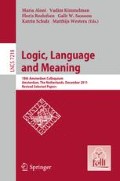Abstract
A new analysis of superlatives is presented, which assigns two functions to the definite article. It reflects the definiteness of the DP in absolute superlatives, and the definiteness of the DegP in comparative superlatives. The analysis accounts for the distribution of the in attributive, amount, predicative and adverbial superlatives in English.
Access this chapter
Tax calculation will be finalised at checkout
Purchases are for personal use only
Preview
Unable to display preview. Download preview PDF.
References
Beck, S.: Lucinda Driving Too Fast Again – the Scalar Properties of Ambiguous Than-Clauses. Journal of Semantics (2012)
Farkas, D., Kiss, K.E.: On the Comparative and Absolute Readings of Superlatives. Natural Language and Linguistic Theory 18(3), 417–455 (2000)
Hackl, M.: On the Grammar and Processing of Proportional Quantifiers: ‘Most’ Versus ‘More Than Half’. Natural Language Semantics 17, 63–98 (2009)
Heim, I.: Notes on Superlatives. MIT (1999) (unpublished manuscript)
Herdan, S., Sharvit, Y.: Definite and Nondefinite Superlatives and NPI Licensing. Syntax 9, 1–31 (2006)
Howard, E.: The most alternative analysis of superlative NPIs ever. Handout of a talk delivered at Workshop on degree semantics and its interfaces, Utrecht (2011)
Romero, M.: Modal Superlatives and 2-place vs. 3-place ‘-est’ . University of Konstanz (2011) (unpublished manuscript)
Rooth, M.: Association With Focus. Ph.D. Dissertation. University of Massachusetts at Amherst (1985)
Rooth, M.: A Theory of Focus Interpretation. Natural Language Semantics 1(1), 75–116 (1992)
Ross, J.R.: A Partial Grammar of English Superlatives. MA thesis. University of Pennsilvania (1964)
Sharvit, Y., Stateva, P.: Superlative Expressions, Context and Focus. Linguistics and Philosophy 25, 453–505 (2002)
Stateva, P.: How Different Are Different Degree Constructions. PhD Dissertation. University of Connecticut (2002)
Szabolsci, A.: Comparative Superlatives. In: Fukui, N., Rapoport, T., Sagey, E. (eds.) MIT WPL, vol. 8, pp. 245–266 (1986)
Author information
Authors and Affiliations
Editor information
Editors and Affiliations
Rights and permissions
Copyright information
© 2012 Springer-Verlag Berlin Heidelberg
About this paper
Cite this paper
Krasikova, S. (2012). Definiteness in Superlatives. In: Aloni, M., Kimmelman, V., Roelofsen, F., Sassoon, G.W., Schulz, K., Westera, M. (eds) Logic, Language and Meaning. Lecture Notes in Computer Science, vol 7218. Springer, Berlin, Heidelberg. https://doi.org/10.1007/978-3-642-31482-7_42
Download citation
DOI: https://doi.org/10.1007/978-3-642-31482-7_42
Publisher Name: Springer, Berlin, Heidelberg
Print ISBN: 978-3-642-31481-0
Online ISBN: 978-3-642-31482-7
eBook Packages: Computer ScienceComputer Science (R0)

